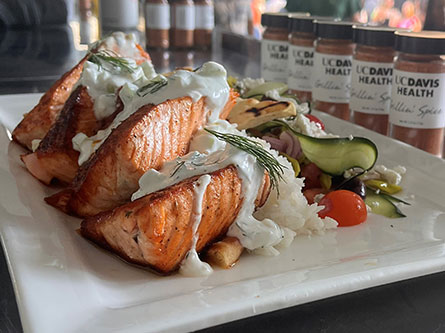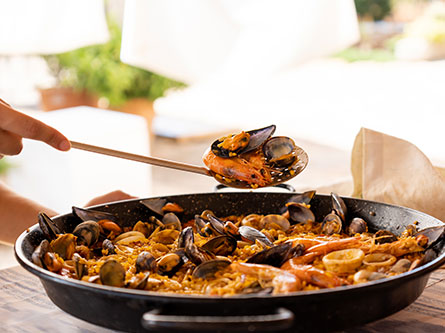Nutrition is important at every stage of life, but it’s especially important for the development of babies in the womb. UC Davis Health dietitian Jaime Dawn Tucker answers some nutrition questions for pregnant mothers to stay healthy and give their child the best start to life. (Tucker is also featured on SELF.com: Which of the Pregnancy Food Rules Are Worth Paying Attention To?)
Why is nutrition so important during pregnancy?
Food and nutrition provide the building blocks of life, and therefore, are especially important during pregnancy! The maternal diet directly impacts the growth and development of the infant. We know that diets lacking key nutrients can result in serious birth complications and even preterm birth or miscarriage. Proper nutrition during pregnancy is vital to setting up both mother and baby for success after birth. Habits created during pregnancy can also help mothers improve their health and well-being long after delivery.
What are common misconceptions people have about pregnancy and food?
The most common pregnancy misconception is the impression that pregnant women are “eating for two.” I don’t inherently dislike this saying, but I think it’s meaning is often misinterpreted.
While it is true expecting moms do need some extra calories, it's not necessary for mothers to “eat for two.” In fact, women don’t actually need any extra calories in the first trimester. Calorie needs increase by 340 calories per day in the second trimester. In the third trimester, intake increases again by 450 calories per day. These increased nutrition needs can generally be met through the addition of a few healthy snacks such as 1 cup of low-fat Greek yogurt, ¼ cup walnuts, and a piece of fruit.
Instead, I urge women to think about the phrase “eating for two” in terms of nutrients. There are many key nutrient needs that significantly increase during pregnancy and need to be met via diet and/or supplementation.
What are the risks of gaining too much weight during pregnancy? How can women make sure they’re getting enough calories and satisfying increased hunger without eating too much?
Gaining too much weight during pregnancy can put mothers at risk for complications such as gestational diabetes, high blood pressure and preeclampsia, and having a large baby (macrosomia). They also may have delivery complication such as preterm birth or increased risk of needing a C-section.
I want to point out that although there are risks associated with excessive weight gain in pregnancy, experiencing increased weight gain or being overweight or obese in pregnancy doesn’t automatically mean you will experience those risks. While it's important to be mindful about weight gain and communicate with your OB provider, it's also important not to get too focused on the numbers. Instead, focus on the promotion of positive behaviors.
One tip I recommend to help mothers promote healthy weight gain is to view snacks as a tool to fill “gaps” in nutrition. This way the focus is on adding nutrient-dense foods that will benefit both baby and mom. For example, it’s important for mothers to get enough calcium to avoid pulling from their own bone stores.
Adding a snack of Greek yogurt or cottage cheese with fruit can be a great way help meet this increased need. Nuts are also rich in magnesium, fiber, and healthy fats. This is a great snack to include while pregnant and can help combat constipation and muscle cramps while also contributing to the baby’s brain development.
Is it safe to lose weight while pregnant? Or should pregnant women focus on that after the baby is born?
Pregnancy is absolutely not the time to start a crash diet or actively pursue weight loss. Many women do find, however, that pregnancy can be a motivating time to adopt dietary and lifestyles changes that may promote mild weight loss or minimize weight gain. As long as you’re not excluding any major food groups and consuming proper nutrition to support fetal development, there’s no major concern.
The mother’s weight gain and the growth of the baby are monitored at each doctor visit. If mothers are not gaining the recommended weight but their baby is growing well, then it’s not necessary to increase weight gain.
How can prengnat women consume the recommended nutrients through their diet?
The American College of Obstetricians and Gynecologists recommends a prenatal vitamin supplement for most pregnant women. This ensures that they get adequate amounts of folic acid and other nutrients. It's important to remember that prenatal supplements are just that – a supplement – and are not intended to replace healthy eating. Here are some important food sources to be aware of:
- Folate: Dark leafy greens like kale and spinach, brussels sprouts, broccoli, beans, peanuts, oranges, bananas, and fortified grains
- Note: Folate is a form of the nutrient found naturally in food. Folic acid is the synthetic found in supplements and fortified food products. Both can contribute to achieving mothers’ increased demand in pregnancy for the prevention of neural tube defects.
- Choline: Eggs, beef, chicken, soy/tofu, fish, quinoa, broccoli, potatoes, kidney beans, mushrooms, peanuts, and dairy products
- Note: This nutrient is not always in standard prenatal vitamins. Therefore, it's important to focus on including food sources daily if your prenatal vitamin doesn't.
- Calcium: Milk or fortified plant-based dairy products, yogurt, tofu, canned sardines or salmon, fortified breakfast cereals, broccoli, almonds, dark leafy greens such as kale, turnip greens, and spinach
- Iron: Meat, seafood/shellfish, lentils, white, kidney and garbanzo beans, spinach, broccoli, raisins, tofu, and fortified breakfast cereals
- Tip: Serve iron-rich foods with a source of vitamin C, such as citrus, potatoes, strawberries, or a small cup of orange juice to help increase absorption.
- Omega 3: Women should get 8-12 oz. of a variety of seafood per week to achieve the recommended intake of DHA (docosahexaenoic acid). This could include 2-3 servings of fish, such as salmon, trout, or sardines, per week. Plant-based sources of Omega 3s include include flaxseed oil or seeds, chia seeds, and soybeans.
- If you avoid or dislike fish, ask your OB provider or dietitian if supplementation is needed.
- If you have questions about safe fish intake while pregnant, the FDA has some advice.
- B12: This vitamin supports brain and nervous system development and is needed to absorb folate and choline. Expectant mothers can eat meat, fish, poultry, milk, nutritional yeast and tempeh to get more B12.
- If you don’t eat animal products, ask your OB or dietitian is supplementation is needed.
Related Good Food Is Good Medicine blog: 10 foods to eat and avoid during pregnancy
Also read: Which of the Pregnancy Food Rules Are Worth Paying Attention To? (From SELF.com)




